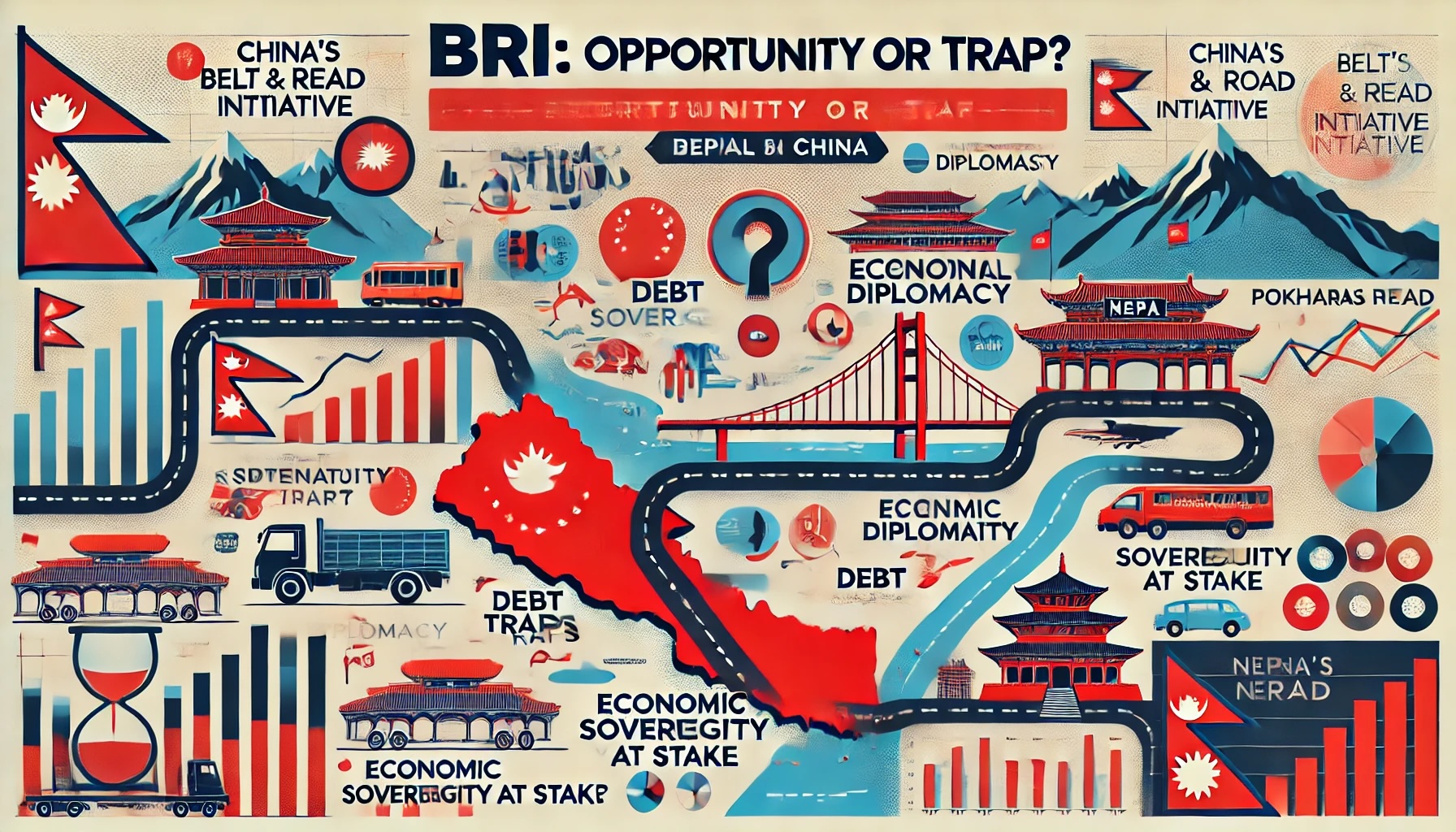Prime Minister, Should Nepal Seek BRI Grants or Fall into a 'Debt Trap'? Income in Paisa, Spending in Rupees!

Anil Tiwari
The experiences of developed nations show that no donor country can single-handedly take full responsibility for a nation’s development. Investors must assess whether a conducive environment exists for investments in productive sectors to yield quick returns. However, China seems eager to implement the Belt and Road Initiative (BRI) in Nepal at any cost. The critical question is whether BRI is truly suitable for Nepal's needs. In the current context, BRI has transformed into a strategy of "taking more than giving," creating challenges for Nepal.
Allegations of government destabilization threats from the north (China) if the BRI is not passed have stirred Nepal's internal politics. This situation is ironic. Frequent government changes in Nepal are not the sole cause of instability; even with a strong government and opposition, stability remains elusive, signaling deeper issues in the country’s political dynamics.
One of Nepal’s ambitious infrastructure projects, the Pokhara International Airport, built with Chinese loans, has yet to operate effectively. China is attempting to incorporate this airport under the BRI framework. Recently, a chartered flight from Kunming, China, carrying 120 passengers, landed at Pokhara Airport to participate in the "2024 Pokhara International Mountain Cross-Country Race" and the "Pokhara-Kunming International Friendship City League."
On this occasion, the Chinese Ambassador to Nepal, Chen Song, expressed his joy on social media, writing, "A warm welcome to the chartered flight from Kunming, China, carrying 120 passengers to Pokhara International Airport. Welcome to Pokhara, and enjoy the competition!"
However, Chen Song's October 2023 remarks, where he identified Pokhara Airport as part of the BRI, have intensified political and economic debates in Nepal. Such statements raise questions about Nepal's sovereignty and financial stability, urging a deeper review of the long-term viability of Chinese debt-funded projects.
China’s attempt to expand international influence through the BRI by targeting economically weak nations is well-known. This effort has long been active in Nepal. Particularly, China's intense interest in expanding military influence in poor South Asian countries has faced natural resistance from the local populace. In Pakistan, Bangladesh, and Sri Lanka, BRI projects have proven economically unsustainable. Nepal appears similarly unprepared to bear the financial burden of such projects. Yet, China continues to pursue its strategy of entangling Nepal in a "debt trap," paving the way for military colonialism.
China, which began its journey to economic power with Maoist principles, became a global economic competitor through Deng Xiaoping's reformed economic policies. Under President Xi Jinping, the BRI has been accused of being a tool for military influence. Rather than a welfare-oriented initiative, the BRI has emerged as a commercial and military strategy, challenging the independence and economic stability of smaller partner nations.
In Nepal, this initiative highlights two fundamental issues. The first is economic. China has seemingly provided easy loans for BRI projects, such as Pakistan's Lahore Metro project. Nepal has similarly used loans for infrastructure development, but the long-term economic impacts of these projects remain unexamined.
In 2017, Nepal and China signed an agreement under the BRI framework. This agreement aimed to enhance cooperation in areas like railways, roads, civil aviation, power grids, and information technology. However, it can be interpreted as a unilateral economic strategy by China, risking Nepal being trapped in a cycle of debt.
Major projects like Bhairahawa and Pokhara International Airports, built with Chinese loans, have strained Nepal's economy due to high interest rates and short repayment periods. BRI loans reportedly carry interest rates of up to 4%, significantly higher than the global average of 1-1.5%, with repayment periods of only 10-15 years. This poses a severe challenge for Nepal's economic capacity.
Given the limited revenue sources of these projects, Nepal risks losing control of national assets, similar to Sri Lanka's leasing of the Hambantota Port to China. This underscores the urgent need for a thorough review of the long-term economic and political consequences of BRI projects.
Controversial decisions made in the name of development and questions about the rationale behind foreign investments demand renewed national awareness in Nepal. Particularly, the appropriateness of Nepal's participation in projects like the BRI requires extensive debate. Allegations that China is weakening Nepal’s economic sovereignty and increasing political influence under the guise of BRI investment have gained traction among Nepal's intellectual community.
Pokhara International Airport is a prime example. Built at a cost of $200 million, it has deepened Nepal’s foreign debt burden. The Chinese Ambassador’s statement linking the airport to the BRI has raised serious concerns about Nepal's sovereignty and economic independence. Limited revenue from the airport raises fears of Nepal being trapped in debt, potentially losing its assets to China.
Nepal's relationship with China cannot be viewed solely as an economic matter. It is part of a geopolitical strategy where smaller nations like Nepal are made financially and militarily dependent through foreign loans. Not just Pokhara Airport, but Bhairahawa Airport and other projects may face similar fates.
Political instability in Nepal has made it easier for foreign powers to fulfill their interests. Frequent government changes and weak leadership have fostered a tendency to accept external pressures at the cost of national interests. This raises the risk that Nepal's involvement in BRI will merely become a process of acquiring loans under the guise of grants.
While many Nepali youth are forced to seek jobs abroad in India, the Gulf, and elsewhere, the employment of thousands of Chinese prisoners in Nepal’s Hongshi Cement factory adds complexity to the nation’s unemployment issue. This calls for further debate on Nepal’s labor policies and the long-term implications of foreign investment.
For the current government under Oli's leadership, pushing BRI is not the sole solution. Previous governments under Congress and Maoist leadership advocated for grants and concessional loans, which China had not agreed to. Now, Oli’s alignment with China under BRI will reveal the extent to which Nepal is willing to enter a "debt trap."
Ultimately, will the BRI become an economic lifeline for Nepal or the source of severe economic problems? Without a clear perspective, hasty decisions will go against national interests. Nepal’s current political landscape demands serious analysis of foreign power balances and strategic policymaking.

Mr. Anil Tiwari is a senior journalist from Birgunj with expertise in Nepal-China relations.
Anil Tiwari



![From Kathmandu to the World: How Excel Students Are Winning Big [Admission Open]](https://nepalaaja.com/img/70194/medium/excel-college-info-eng-nep-2342.jpg)
